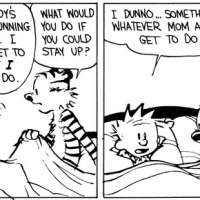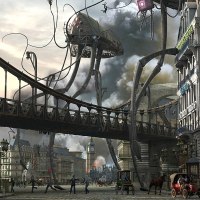Future minds – part 1: the beginning
I grew up with science fiction. No surprise I guess, since I’ve always been fascinated by the future and what miracles it could hold. As a kid, I watched all the sci-fi shows on telly, but they were… well, not entirely focused on realism and probability-related futurology (Space 1999, anyone?).
Then, as a teenager I started reading The Big Novels: The war of the worlds, From the Earth to the Moon, Nineteen Eighty-Four and the rest. And later, when I started Upper secondary school I hit the jackpot: the town library’s card catalogue* had a subsection for science fiction.
Over the course of the next three years, I went through every single book in that section. Most of them were in English, which helped me getting better at my second language, but above all it was a very multi-faceted collection of books, written by very diverse group of authors. During that time, I hit on such treasures as the Foundation Trilogy, The left hand of darkness and The man in the high castle. Many wondrous visions of a new future but also many dystopian predictions of our inevitable doom.
There were also a few books that delved into the depth of what it would mean to invent a conscious machine, a new mechanical species of intelligent beings. Isaac Asimov cemented the Three Laws of Robotics already during the second world war, laying the foundation to what essentially became synthetic morals. But later, other authors ventured on. Arthur C. Clarke’s 2001 – a space odyssey warned us of autonomous systems going mad. William Gibson showed with in his Sprawl trilogy that an artificial intelligence could have its own agenda, and that its morals might not necessarily correlate with our own.
…This is turning out to be a long intro. Sorry about that. But its purpose is to illustrate that when it comes to science fiction and the socio-economic, moral or philosophical consequences of technological advances, I’ve been an avid study for several decades.
The birth of a concept – the synthetic worker
In the beginning there was the Rossum’s Universal Robots. The year was 1921 and the Czech writer Karel Čapek premiered his new play R.U.R. in Prague**. It was the birth of the concept of the humanoid robot, a synthetic worker. Manufactured out of synthetic organic matter, they had become cheap enough to be bought and owned by almost anyone by the 1950s. They were the ideal slaves and had liberated human kind from hard labour. The robots themselves however were not happy and had their own ideas…
The idea of synthetic or mechanical humanoid machines was immediately absorbed by popular culture and only 6 years later the Maschinenmensch Maria featured in the German science fiction film Metropolis.
And from then on we see a surge in mechanical or synthetic humanoids in literature and film: mad scientists creating mechanical versions of Frankenstein’s monster, alien robots from outer space, robotic police officers turning on their creators and running amok, mechanical assassins from the future sent back to assure humanity’s ultimate doom. Generally evil, and always powerful, robots played on our fear of the unknown, the super-predator, the vengeful god.
The faceless intelligence
Later, with the birth of the computer age, we abandoned the concept of a mechanical humanoid body and started exploring the idea of a virtual mind, living inside our computers. We see defence systems going mad (but still wanting to play games), internet-based conscious intelligences taking on the role of Voodoo gods, uploaded brain scans of spiny lobsters becoming sentient and wanting to defect from their Russian intelligence agency employer. It’s clear that the literal world is full of virtual minds just as amazing as their robotic counterpart.
Of course, just because a mind is virtual it doesn’t mean it doesn’t rely on physical technology. Dr Dave Bowman managed to defeat HAL by physically remove the memory banks from the mainframe in the afore-mentioned 2001 – a space odyssey. And – although a bit more tongue-in-cheek – Chell survives by destroying the personality cores that keeps the homicidal AI GLaDOS functioning in the computer game Portal.
The dull reality
In real life, creating synthetic minds is less easy. In fact, even though we’ve successfully built programs that can beat us at chess or poker, we haven’t even gotten close to create something that’s self-aware. We can mimic it well enough, but when it comes to the real deal? No luck.
This is rather predictable since we have only a very vague understanding of what a conscious mind actually is. So far, our best bet is that the key is a continuous experience of time (something I mentioned in my post I don’t smell a soul anywhere near you), i.e. a consistent memory time line.
But is that enough? Will a conscious mind spontaneously arise if we manage to create such a time line? And what is that anyway? How do we create a program that experiences time? Suffice to say, I wouldn’t hold my breath waiting for the first ever self-aware machine; you would end up pretty blue in the face…
What’s coming
That’s not saying we won’t eventually succeed. Be it 10 years or 50, I’m convinced we will one day see the birth of the very first artificial mind. And the implications of this technological feat will be vast. It could well be the one thing that we’ve invented that would actually impact on the history of the whole universe.
I know. Grand words. But they’re not chosen for dramatic effect alone. There’s something utterly fundamental about this act, something game-shifting, ranging far beyond learning how to build a fire or grow crops or fly to the moon. This will not be primarily a technological achievement, it will be a philosophical one. We would have created not just new minds to experience the world, but a whole new type of mind, that would experience the world in ways it never has been before. The first artificial mind will redefine life, intelligence and possibly even reality itself.
And, since we don’t know anything of how these new minds would perceive their world – or us – it fills us with dread. What will we have created? Our ever-loyal and obedient servants or our new mortal enemy, set upon the destruction of all humankind?
That, among other things, will be addressed in part two…
* Remember card catalogues? Or – if you’re a younger reader – do you remember seeing them in films? Cabinets filled with little drawers containing thousands upon thousands of index cards, listing the title, author, publish date and – most significantly – the shelf location of the book itself. (Incidentally, did you know that the card catalogue was invented by the father of modern taxonomy, the famous Swedish 18th century scientist Carl von Linné? It’s true!)
** Prague is a lovely city. You should go. No, really. Just look at it:



















You didn’t mention John Carpenter’s awesome (crap, a film only for the SciFi-obsessed) where a nuclear smart bomb in space fails to go off because it gets into an existential crisis of itself. Oh and there was that murderous bouncing ball alien. Which was just odd.
LikeLike
You’re up early for a Sunday, aren’t you?
You mean Dark Star? With a bomb struck by Cartesian skepticism? No, I didn’t mention that. *pause* You reckon I should have?
LikeLike
Yes, sorry, I forgot to mention the film. Level up for spotting it anyway! Love that film. He did it as part of a student project or something.
I think so, whilst HAL was AI struck for externally imposed self-conflict, the bomb (let’s call him Dave) was internally self-conflicting.
LikeLike
True, that is rather philosophical a theme, isn’t it?
LikeLike
And of course I’m up. (a) it’s TT (YYYYYYEEEEAAAAAAHHHHHHHHH!!!!!!) and (b) you know what it’s like having a 2-year old, or have you forgotten already?
LikeLike
Yeah, I don’t miss the TT races, that’s for sure…
(And no, I haven’t forgotten what it’s like to have a 2-year-old, since Morris is still that age.)
LikeLike
And by the way, shame on you for using Speilberg’s War of the Worlds instead of the original – and far better version.
LikeLike
That is the original War of the Worlds! Look, it’s early 20th century London and everything. Drawn by Robert Czarny, I believe.
LikeLike
Yes, I remember card catalogues. Someday, my dream is to find one no one wants and to bring it home and repurpose it for something else…jewelry or craft supplies or something. I have such a fond memory of them. And I love cabinets with cunning little drawers.
That’s somewhat off-topic. Not a surprise, being me.
I think the creation of true AI will be both exciting and terrifying. I look forward to seeing what they think, HOW they think, what they come up with, what they could solve we couldn’t…but the chance they’ll realize the limitations of our own intelligence and decide we’re useless is always there, of course, and it’ll be a “what have we wrought?” moment.
But you know me. Science always fascinates. So the curiosity always wins out over the fear.
LikeLike
Me too. I’m too curious about what a synthetic mind could be to worry too much about the consequences. And even if the worst would happen, and humanity was exterminated, we wouldn’t leave without a trace: we would have left a super-intelligence behind; something that would never had existed if we hadn’t created it in the first place.
Ok, that might seem dark and depressive. But I can’t help being excited about the prospect of us creating something that could potentially be smarter than us. Bigger than us. Better.
LikeLiked by 1 person